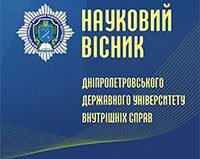Eleonora SKYBA
SKYBA E. (2022), SEXUAL VIOLENCE DURING ARMED CONFLICTS; Scientific Bulletin of Dnipropetrovsk State University of Internal Affair, Special Issue №2, 133-139
DOI: 10.31733/2078-3566-2022-6-133-139
ABSTRACT. The article analyzes that the study of gender-based violence as a socio-cultural phenomenon during armed conflicts through the methodology of pluralism provides a comprehensive and well-founded consideration of both social and individual sources of aggression in the form of gender-based violence. The conducted research establishes that the tendency to sexual violence has several factors, including socio-cultural factors. The interaction of dialectical, comparativist, and structuralist approaches made it possible to consider the problem of gender inequality from a fundamentally new position: it was not gender differences, or in other words, differences between men and women, that really determined the dominance-subordination relationship of men and women in a reasonable and natural way, but, on the contrary, it were gender differences, which are used by institutions of power to justify dichotomy and inequality. The principle of methodological pluralism, using the achievements of leading scientific schools regarding the relationship of difference, dichotomy and inequality, revealed the true order of relations between the categories of difference and inequality. The work indicates that such methods as structuralism and the method of ascent from the partial to the general demonstrated the influence of some factors on the formation of values. Crises of various natures, the events of the modern war prove that the world human community has lost the ability to control the general situation regarding aggression and thus loses an active role in the development of the general picture of the world. Neglect of the principles of equality and respect for the requirements of gender equality automatically leads to gender violence; it is the result of the application of the ideology of the last century and reflects the level of development of all types of socio-cultural and economic relations. Sexual violence, as we see from present and past experience, is a typical phenomenon during armed conflicts. Often, the possibility of unpunished violence against captured and defeated is perceived as one of the trophies of war, but sometimes, especially during inter-ethnic conflicts, it is interpreted as an audacious manifestation of the prevailing stereotypes of hegemonic masculinity. During armed conflict, sexual violence is often used as a means of psychological warfare to demoralize the adversary or as an act of incitement to commit specific violence. We emphasize that such behavior is especially relevant for patriarchal societies, where maturity and courage are associated with violence, dominance and oppression of the weak or defenseless as a manifestation of power. It has been established that gender difference in such authoritarian societies serves as a justification for inequality and discrimination and is formed and reproduced by power structures in all spheres of socio-cultural and economic life.
Keywords: sexual violence, gender violence, aggression, patriarchal gender relations, patriarchal ideology.
- References:
- Hnatenko, P. I. (2017) Psykholohiya ahresyvnosti lyudyny [Psychology of human aggressiveness]. Kyiv : Naukova dumka, 172 p. [in Ukr.].
- Komykh, N. H. (2018) Henderovane misto: sproba sotsiolohichnoyi interpretatsiyi. Osobystist i sotsialni instytuty v urbanizovanomu suspilstvi: misto Dnipro [The gendered city: an attempt at a sociological interpretation. Personality and social institutions in an urbanized society: the city of Dnipro] : monohraf. : v 2 t. / za zah. red. profesora V. V. Kryvosheyina. T. 1. Dnipro : Vyd-vo LizunovPres, pp. 256–272. [in Ukr.].
- Hunnicutt, G. (2021) Gender Violence in Ecofeminist Perspective Intersections of Animal Oppression, Patriarchy and Domination of the Earth. Routledge, 160 p.
- Lerner, G. (1986) Creation of Patriarchy, Routledge. London, 368 p.
- O’Toole, L., Schiffman, J., Sullivan, R. (2020) Gender Violence. New York University Press. New York, 600 p.
- Perez, C. (2019) Invisible Women: Exposing Data Bias in a World Designed for Men: A Book for All. New York : Abrams Press, 272 p.
- Prah, Mansah (2013). Insights Into Gender Equity, Equality And Power Relations In Sub Saharan Africa. Fountain Publisher, Uganda. 398 p.
- Scheele, J., Barker, M.-J. (2019) Gender. Icon Books, 176 p.
- Skyba, E., Tkachenko, K. (2021) Gender challenges of modern society. Philosophy, Economics and Law Review. Vol. 1. No. 2, pp. 18–24.
- Skyba, E. (2020) Phylosophy of postmodernism as a theoretical justification of the women social value. Scientific Journal of Polonia University. Vol. 38, pp. 294–303.
- Yarhouse, M., Sadusky, J. (2020) Emerging Gender Identities: Understanding the Diverse Experiences of Today’s Youth. Brazos Press, 242 p.
